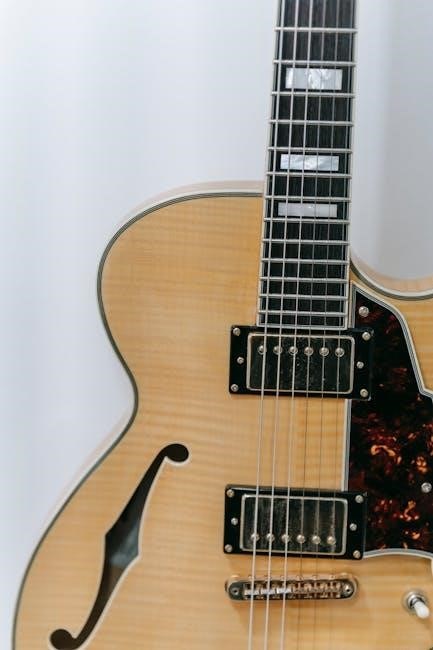guitar music theory pdf

Guitar music theory provides a foundational understanding of notes, chords, and scales, essential for composing and improvising․ Popular PDF resources like The Guitarist’s Music Theory Book by Peter Vogl and Fretboard Theory by Desi Serna offer comprehensive guides․ These materials help guitarists of all levels master music theory concepts, from basic chords to advanced techniques, ensuring a deeper connection to their music․

Understanding the Basics of Music Theory for Guitar
Guitar music theory begins with understanding notes, chords, and scales․ The fretboard is a visual representation of music theory, where notes repeat every octave․ Chords are built from scales, forming the foundation of songs․ Key signatures, based on the circle of fifths, determine which notes and chords are used in a song․ Scales, such as major and minor, create the emotional core of music․ PDF resources like The Guitarist’s Music Theory Book and Fretboard Theory provide detailed guides for mastering these concepts․ These materials help guitarists connect theoretical knowledge with practical playing, enhancing composition and improvisation skills․

Importance of Music Theory for Guitarists
Music theory is crucial for guitarists as it enhances creativity, improvisation, and composition skills․ Understanding theory allows players to communicate musical ideas effectively and appreciate the structure of songs․ It simplifies learning chords, scales, and progressions, making playing more intuitive․ Guitarists can express emotions more profoundly by grasping how notes and chords interact․ Resources like The Guitarist’s Music Theory Book and Fretboard Theory provide structured learning․ Theory isn’t just rules—it’s a tool to expand musical possibilities․ Whether writing songs or improvising, music theory empowers guitarists to connect with their instrument on a deeper level, fostering growth and mastery in their musical journey․

Essential Concepts in Guitar Music Theory
Guitar music theory involves understanding the fretboard layout, chord shapes, and scales․ Key concepts include notes, intervals, triads, and the circle of fifths․ These fundamentals, covered in resources like The Guitarist’s Music Theory Book, provide a solid foundation for playing and composing music effectively․
Notes on the Fretboard: Understanding the Guitar Neck
Mastering the guitar neck involves identifying notes across the fretboard, essential for scales, chords, and improvisation․ PDF resources like Fretboard Theory provide detailed maps of each musical key, visualized through the circle of fifths․ These visual aids help guitarists understand how notes relate across the fretboard, fostering a deeper connection between theory and practice․ By studying these materials, players can navigate the neck confidently, enabling them to create and perform music more effectively․ Such resources are invaluable for both beginners and advanced guitarists seeking to enhance their musical understanding and technique․ Regular practice with these tools ensures lasting improvement․
Major and Minor Scales: The Foundation of Music
Major and minor scales are the building blocks of music, defining its structure and emotional depth․ For guitarists, understanding these scales is crucial for composing and improvising․ PDF resources like The Guitarist’s Music Theory Book and Fretboard Theory provide detailed guidance on mastering these scales․ They explain how major scales create a sense of resolution, while minor scales evoke melancholy․ These resources also offer practical exercises and fretboard maps to help guitarists apply scales in real-world scenarios․ By grasping major and minor scales, guitarists can unlock the fundamentals of music theory, enhancing their ability to create and perform with confidence and creativity․
Chord Construction: Triads and Seventh Chords
Chord construction is a fundamental aspect of guitar music theory, focusing on how chords are built from scales․ Triads, consisting of a root, third, and fifth, form the basis of most chords․ Seventh chords expand on triads by adding a seventh, creating richer harmonies․ PDF resources like The Guitarist’s Music Theory Book and Fretboard Theory provide detailed explanations of chord construction․ These guides explain how to build major, minor, diminished, and augmented triads, as well as major seventh, minor seventh, and dominant seventh chords․ Understanding chord construction allows guitarists to create complex harmonies and improvise effectively, making it a vital skill for any musician․
The Circle of Fifths: A Guitarist’s Guide
The Circle of Fifths is a visual tool mapping keys and their relationships․ PDF resources like Vogl’s The Guitarist’s Music Theory Book explain its role in understanding key signatures, chord progressions, and scales, aiding guitarists in improvisation and composition effectively․
Key Signatures and Their Relationship to the Guitar
Understanding key signatures is crucial for guitarists, as they dictate which notes are played within a key․ PDF resources like Fretboard Theory by Desi Serna and The Guitarist’s Music Theory Book by Peter Vogl provide detailed maps of the guitar neck, showing how each key aligns with the fretboard․ These visual aids help guitarists identify sharps, flats, and naturals, enabling them to navigate the neck more confidently․ By mastering key signatures, guitarists can improve their sight-reading, improvisation, and overall musical understanding․ These resources are essential for both beginners and advanced players looking to deepen their theoretical knowledge․
Using the Circle of Fifths for Songwriting and Improvisation
The Circle of Fifths is a powerful tool for songwriting and improvisation, helping guitarists understand key relationships and chord progressions․ PDF resources like Reddit’s shared guitar theory guide provide visual maps of the Circle of Fifths, linking keys to the fretboard․ This allows guitarists to identify chords, scales, and relative minors easily․ By mastering the Circle of Fifths, musicians can craft harmonious progressions and improvise confidently․ These resources emphasize practical applications, making the Circle of Fifths an indispensable asset for guitarists aiming to enhance their creative and technical skills․

Advanced Guitar Music Theory Topics
Advanced topics include modes, harmonic function, and complex chord progressions․ PDFs like Fretboard Theory and Absolute Essentials of Music Theory for Guitar provide in-depth insights, enhancing musical understanding and application․
Modes and Their Application in Guitar Playing

Modes are essential for creating diverse musical moods and solos․ Resources like Fretboard Theory and Absolute Essentials of Music Theory for Guitar detail each mode’s structure and application․ By understanding modes, guitarists can craft intricate melodies and harmonies, enhancing their playing․ These PDFs provide visual aids and exercises, making complex concepts accessible․ Exploring modes opens up new possibilities for composition and improvisation, allowing guitarists to express a wide range of emotions and styles with precision․ Mastering modes is crucial for advancing guitarists seeking to expand their musical versatility and creativity in various genres․

Harmonic Function and Chord Progressions
Harmonic function and chord progressions are vital for creating cohesive and emotionally resonant music․ Guitar music theory PDFs, such as Music Theory for the Rock Guitarist and Absolute Essentials of Music Theory for Guitar, delve into diatonic chords and their functions․ These resources explain how chords progress within keys, forming the harmonic backbone of songs․ Understanding harmonic function allows guitarists to craft meaningful chord sequences and transitions, enhancing their compositions and improvisations․ These PDFs often include chord charts, exercises, and practical examples to master diatonic progressions and their emotional impact․
Practical Application of Music Theory on the Guitar
Guitar music theory PDFs, like JustinGuitar’s eBooks, provide practical lessons on applying theory to playing․ These resources focus on chord progressions, scale usage, and composing, enhancing musicianship․
Reading Music and Tablature for Guitarists
Mastering how to read music and tablature is crucial for guitarists seeking to expand their musical knowledge․ PDF resources like The Guitarist’s Music Theory Book and Fretboard Theory provide detailed guides on understanding standard notation and tablature․ These materials explain how to interpret notes, rests, time signatures, and chord charts․ Additionally, they offer exercises to improve sight-reading skills, which are essential for playing complex compositions․ By learning to read music, guitarists can access a broader repertoire and enhance their overall musicianship, making these PDF books invaluable tools for both beginners and advanced players aiming to refine their skills․
Ear Training and Its Role in Music Theory
Ear training is a vital component of music theory, enabling guitarists to recognize and reproduce musical elements like pitches, intervals, and chord progressions․ PDF resources such as Music Theory for Guitar and Fretboard Theory include exercises designed to enhance aural skills․ These materials often provide practical lessons on identifying notes, scales, and chords by ear, which are essential for improvisation and composition․ By improving their ears, guitarists can better understand musical structures and express themselves more effectively․ These PDF guides offer structured approaches to ear training, making it accessible for guitarists of all skill levels to develop this fundamental musical ability․

Recommended Guitar Music Theory PDF Resources
Popular guitar music theory PDFs include The Guitarist’s Music Theory Book and Fretboard Theory, offering practical lessons and visual aids for mastering guitar music theory concepts effectively․
Top PDF Books for Guitar Music Theory
Some of the most highly recommended PDF books for guitar music theory include The Guitarist’s Music Theory Book by Peter Vogl, known for its practical approach, and Fretboard Theory by Desi Serna, which focuses on advanced concepts․ These resources provide detailed explanations of scales, chords, and harmonic functions, making them invaluable for both beginners and experienced players․ Music Theory for Guitarists by Tom Kolb is another excellent choice, offering clear lessons on music theory fundamentals․ These PDFs are widely praised for their clarity and effectiveness in helping guitarists understand and apply music theory to their playing․
Free Online Resources for Guitar Music Theory

There are numerous free online resources available for learning guitar music theory․ Websites like Reddit’s r/guitarlessons offer a PDF guide visualizing the guitar neck notes and the circle of fifths, aiding in understanding musical keys․ YouTube channels provide free guitar theory lesson PDFs, such as the one announced in a community update․ The Internet Archive hosts free eBooks like Absolute Essentials of Music Theory for Guitar and Fretboard Theory by Desi Serna, which are excellent for intermediate and advanced players; These resources are invaluable for guitarists seeking to deepen their theoretical knowledge without cost․





